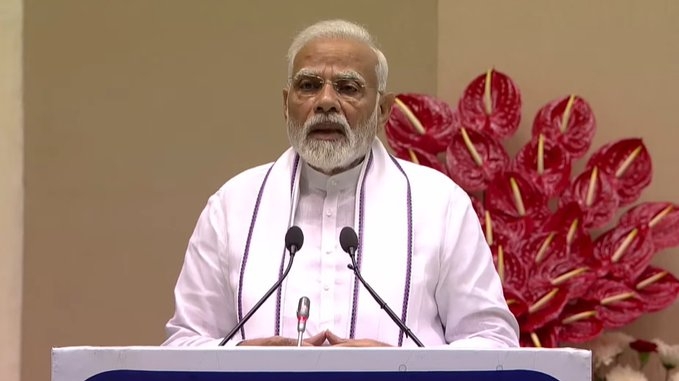National Logistics Policy and Gati Shakti Mission will support each other: PM Modi
The policy, unveiled by Prime Minister Narendra Modi on Saturday, reflects the government"s positive intent to address all the core challenges of the logistics and supply chain industry, Anshuman Singh, the Chairman and Managing Director of Stellar Value Chain Solutions said.
Total Views |
New Delhi, Sept 19: The National Logistics Policy sets the roadmap for developing a more interconnected and tech-driven framework for building cost and operational efficiency in the sector, industry experts said.

The policy, unveiled by Prime Minister Narendra Modi on Saturday, reflects the government's positive intent to address all the core challenges of the logistics and supply chain industry, Anshuman Singh, the Chairman and Managing Director of Stellar Value Chain Solutions said.
It will not only inspire all logistics players to come together and collaborate to build logistics competitiveness globally but also increase the confidence of investors who are keen to invest in the logistics sector, Singh added. According to him, by realigning the operational dynamics and formulating the pathway to reduce the logistics cost to a single-digit, the policy puts the industry on the cusp of the next phase of growth. Rizwan Soomar, Chief Executive Officer and Managing Director, DP World Subcontinent said that the multipronged approach by the government adopted in the policy to suggest regulatory and procedural reforms across infrastructure, services, and human capital provides a comprehensive strategic direction to the sector and will be a crucial catalyst in attracting investments. The focal push for digitization through platforms like ULIP and E-LogS is crucial to support the designed services improvement framework in improving regulatory inter-operability, standardization of logistic processes, and bringing the entire multimodal network onto a single digital dashboard, enhancing visibility and transparency for all stakeholders. According to Vineet Agarwal, MD at Transport Corporation of India, the push towards seamless multimodal transportation and modern connectivity will be a game changer as it will shift the transportation stress from just roads to other modes as well. The Unified Logistics Interface Platform (ULIP) tenant of the NLP will enhance customer visibility and enable logistics companies like TCI to adopt digitization at a much larger scale, Agarwal stated. The new logistics policy will help make the sector an integrated, cost-efficient, resilient, and sustainable logistics ecosystem in the country as it covers all bases of the sector along with streamlining rules and addressing supply-side constraints, said Pranav Goel, Co-founder-CEO, of Porter. The Digital Integration System for logistics ecosystems will lead to seamless and faster workflow, making logistics significantly efficient, he said.
The e-handbook launched for the standardization of the warehousing sector, will enable the small and large third-party logistics and warehousing players in standardizing their processes and automating their systems and processes thus reducing cost and leading to higher profitability, said Lancy Barboza, MD, Flomic Global Logistics Ltd. NLP will help the last-mile to be more efficient and faster to fill up the gap of transporter where business can benefit in terms of time and cost, said Zaiba Sarang, Co-founder, iThink Logistics. According to Prashant Rane, CEO, of Oneworld Logistics, the policy has taken a holistic approach to address various pain points of the logistics industry and has laid out a blueprint for systematic growth of the sector. "The policy aims to provide structure to a highly fragmented and unorganized logistics sector. Tech-enabled solutions backed by infrastructure development will provide the much-needed impetus to the sector," he said.

